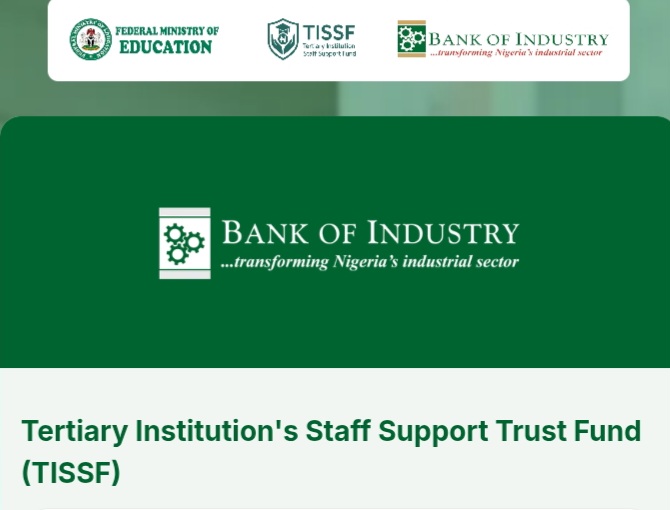The Federal Government has officially launched the Tertiary Institutions Staff Support Fund (TISSF) at the Federal University of Technology, Akure (FUTA) — a landmark welfare initiative aimed at improving the financial well-being of academic and non-academic staff across Nigeria’s higher institutions.
The scheme, which provides zero-interest loans of up to ₦10 million, was formally flagged off by the Minister of Education, Dr. Tunji Alausa, as part of the Federal Government’s renewed effort to strengthen the tertiary education system and enhance the welfare of its workforce.
Scheme Overview
According to the Ministry of Education, the Tertiary Institutions Staff Support Fund (TISSF) is structured to offer accessible, zero-interest financial support to full-time staff of federal universities, polytechnics, and colleges of education.
Eligible beneficiaries can access loans not exceeding 33.3% of their annual gross salary, with a one-year moratorium and a repayment period of up to five years.
The loan is designed to assist staff in meeting essential financial needs such as:
- Housing and accommodation projects
- Transportation (including purchase of vehicles or motorcycles)
- Medical care and health emergencies
- Small-scale business or agricultural ventures
- Educational and professional advancement
Dr. Alausa emphasized that the TISSF represents a significant step toward revitalizing staff morale, reducing economic hardship, and curbing brain drain among Nigeria’s tertiary institution workforce.
Beneficiaries and Rollout
Speaking during the flag-off ceremony, Dr. Alausa disclosed that over 9,000 tertiary institution staff have already benefited from the fund in its initial phase. Beneficiaries were drawn from 219 public tertiary institutions, representing around 28% of the 33,000 verified applicants across the country.
He noted that subsequent phases of the scheme would cover more eligible applicants, as the government works to ensure that every qualified staff member benefits.
The Minister commended the Education Support Services Department of the Ministry for its dedication to the program’s execution and praised FUTA for its exemplary role in hosting the official launch.
Government’s Commitment
According to Dr. Alausa, the welfare of educational staff remains central to the Federal Government’s ongoing reforms in the education sector.
“The launch of this fund shows our unwavering commitment to improving staff welfare and restoring dignity to teaching and learning. A financially stable staff member is a more productive and motivated educator,” he said.
He added that the initiative complements broader policy interventions aimed at transforming Nigeria’s education system through innovation, infrastructure improvement, and enhanced funding for research and human capital development.
Reactions from the Host Institution
The Vice-Chancellor of FUTA, Prof. Adenike Temidayo Oladiji, applauded the Federal Government for initiating the scheme, describing it as a “timely and progressive intervention” in the face of current economic realities.
She noted that the initiative would “not only uplift staff welfare but also reinforce the institution’s capacity to deliver world-class teaching and research.”
Some academic and non-academic staff at FUTA who attended the event also expressed optimism that the zero-interest nature of the loan would enable them to manage personal and family expenses more effectively without falling into debt traps.
Transparency and Oversight
The Ministry of Education has assured that a strict monitoring and evaluation framework is in place to ensure accountability and proper utilization of the fund.
Each participating institution will be required to submit quarterly reports detailing disbursement and repayment records, while the Ministry’s oversight committee will handle periodic audits to maintain transparency.
Dr. Alausa also disclosed that the government plans to introduce capacity-building programs to help beneficiaries effectively manage their funds, especially those investing in small businesses or agricultural projects.
What Lies Ahead
While stakeholders have commended the Federal Government for this initiative, education experts say its long-term sustainability and transparent management will determine its overall success.
Analysts argue that while the TISSF addresses immediate welfare concerns, it must be complemented by deeper reforms in areas such as infrastructure, remuneration, and research funding to create a truly resilient education system.
Conclusion
The flag-off of the ₦10 million Tertiary Institutions Staff Support Fund at FUTA marks a major milestone in Nigeria’s ongoing efforts to reposition its higher education sector.
The initiative offers real hope to thousands of university and polytechnic workers struggling with economic challenges. However, questions remain:
Will the fund reach every qualified staff member without bureaucratic delays? Can it be sustained in the long term without political interference? And will this effort translate into better teaching quality, research output, and institutional stability?
As implementation progresses, the success of this program will depend not just on its financial impact, but on how well it restores confidence, productivity, and purpose to Nigeria’s academic community.



